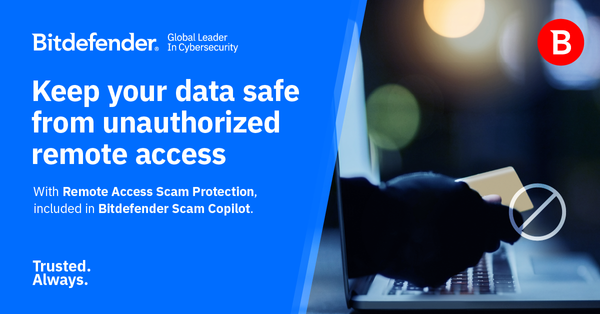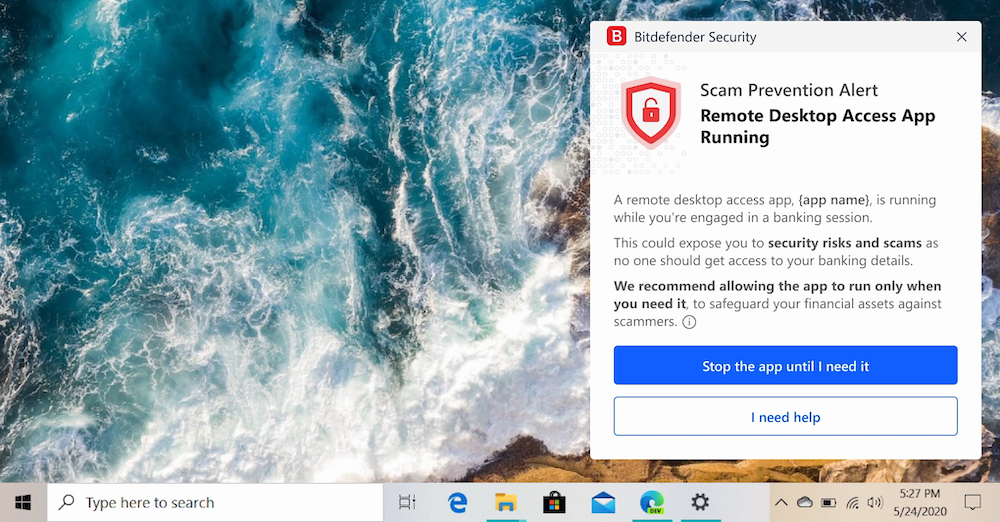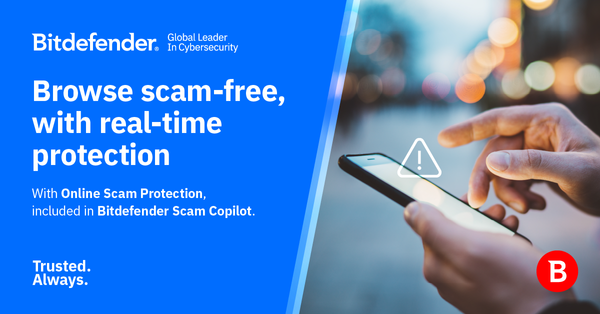Remote Access Scam Prevention – Your Trusted Anti-Scam AI Companion

The phrase “remote access tool” became a household term during the pandemic, as businesses and individuals relied on these solutions to manage devices and troubleshoot issues. However, these same tools are now being weaponized in sophisticated scams targeting unsuspecting users.
The newly launched Scam Copilot feature in select Bitdefender products introduces a groundbreaking Remote Access Protection feature that tackles the rising threat of remote access scams with timely alerts and proactive safeguards. Here's why this new feature is a must-have in today's digital world.
Scammers are master manipulators, often using social engineering tactics to exploit their victims. They impersonate tech support representatives, bank employees, or service providers, convincing unsuspecting users to install remote desktop software under the various pretexts. Remote access tools can be configured to run in the background, allowing scammers to watch and wait for the right moment to act.
The scammer's playbook includes exploiting trust and technology
Cyber-criminals use these remote sessions to access online banking portals, steal credentials, redirect funds, or install malicious software to collect data over time. One common claim is convincing victims they’ve made substantial profits on fraudulent platforms. When victims attempt to withdraw these non-existent gains, the scammers claim there are "technical issues" preventing the transfer. To "help" resolve the problem, they request remote access to the victim’s computer, under the guise of assisting with fund transfers or completing identity verification processes. Once granted access, these criminals manipulate banking sessions, transferring money to their own accounts or installing spyware to harvest sensitive information for future exploitation. The illusion of legitimacy and urgency leaves victims unaware until the damage is done, making remote access scams a critical component in these complex fraud schemes.
Some other times, scammers modify system settings, leaving backdoors for future exploits while evading detection. A striking example involves scams originating from call centers, particularly in regions like India, where fraudsters often convince victims to grant them remote access under the pretense of fixing technical issues. Once inside the victim's computer, they do more than just address the "problem"—they manipulate system settings to create persistent access points, such as installing remote desktop software to auto-start or configuring tools like "Sticky Keys" to function as a secret keylogger or access mechanism. This allows scammers to re-enter the system days, weeks, or even months later, facilitating additional theft or data harvesting while keeping their presence concealed. These tactics have been uncovered in several crackdowns on fraudulent call centers, exposing the systematic exploitation of trust and technology for financial gain.
These attacks often culminate in significant financial losses or identity theft, leaving victims grappling with the aftermath.
Remote access scams are ramping up
Remote access scams are not isolated incidents - they've become a widespread problem. Financial institutions and cybersecurity experts frequently report cases where scammers exploit remote access tools to bypass authentication mechanisms and directly manipulate transactions. The anonymous nature of these tools makes it easy for criminals to mask their presence, often leaving victims unaware until the damage is done.
Compounding the issue is the inherent trust users place in legitimate applications. Unlike traditional malware, remote access tools are not inherently malicious, making their exploitation even harder to detect without specialized protection.
Remote Access Scam Protection keeps an eye on your device
Scam Copilot introduces Remote Access Scam Protection, a feature designed to protect users at the most vulnerable moments. This technology continuously monitors remote desktop applications on Windows devices, detecting when they are active-even if no session is currently in use. If a user initiates an online banking session or accesses financial services while a remote access tool is running, Scam Copilot immediately issues a warning. This alert ensures users can pause and secure their system before proceeding.

Scam Prevention Alerts allow users to stop remote access tools from automatically starting with their system, reducing the risk of them being exploited without the user's knowledge.
Beyond alerts, Scam Copilot integrates an educational layer, helping users understand the risks associated with remote access tools and providing actionable recommendations to enhance their security.
Why this feature is critical for everyone
The introduction of this feature couldn't come at a better time. As digital interactions increase, so do the risks associated with online scams. Remote access tools, while immensely useful, have become a double-edged sword. Without proper safeguards, even tech-savvy individuals can fall victim to these sophisticated attacks.
The Bitdefender Scam Copilot doesn't just provide reactive protection - it actively works to prevent threats before they can escalate. By combining AI-driven intelligence with actionable insights, it bridges the gap between convenience and security, ensuring that legitimate remote access use is safe from exploitation.
Protecting your digital life with Scam Copilot
Scam Copilot's Remote Access Protection is more than just a security enhancement; it's a necessary evolutionary security layer in combating modern cyber threats. By addressing the vulnerabilities inherent in remote access tools and providing timely, actionable alerts, it empowers users to take control of their online safety.
Availability
Remote Access Scam Protection is available now as part of the Scam Copilot feature in Bitdefender Ultimate Security, Bitdefender Ultimate Security Plus (U.S. only), Bitdefender Ultimate Small Business Security (U.S. only) and Bitdefender Premium Security with support for Windows, macOS, iOS and Android.
tags
Author

The meaning of Bitdefender’s mascot, the Dacian Draco, a symbol that depicts a mythical animal with a wolf’s head and a dragon’s body, is “to watch” and to “guard with a sharp eye.”
View all postsRight now Top posts
Outpacing Cyberthreats: Bitdefender Together with Scuderia Ferrari HP in 2025
March 12, 2025
Streamjacking Scams On YouTube Leverage CS2 Pro Player Championships to Defraud Gamers
February 20, 2025
How to Identify and Protect Yourself from Gaming Laptop Scams
February 11, 2025
Your Device ‘Fingerprint’ Will Go to Advertisers Starting February 2025
December 24, 2024
FOLLOW US ON SOCIAL MEDIA
You might also like
Bookmarks







